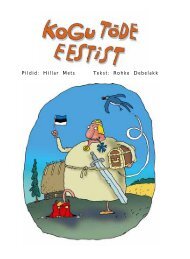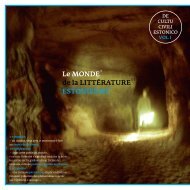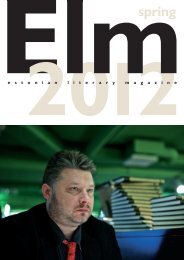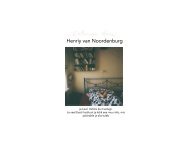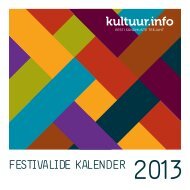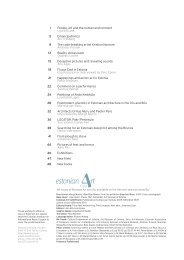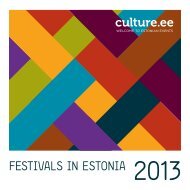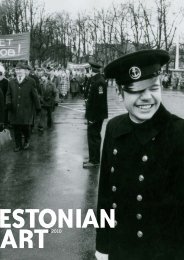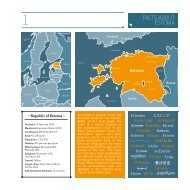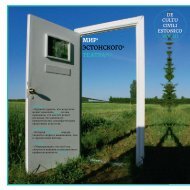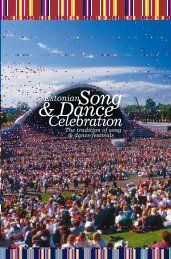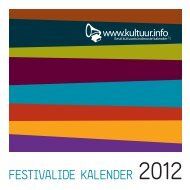Autumn 2013
Autumn 2013
Autumn 2013
You also want an ePaper? Increase the reach of your titles
YUMPU automatically turns print PDFs into web optimized ePapers that Google loves.
90 21<br />
00<br />
Union<br />
serving was the prose writer August Mälk<br />
(1945–1982), who was followed by the poet<br />
Kalju Lepik (1982–1999). After his death, the<br />
prose writer Enn Nõu, acting as chairman,<br />
successfully united the Estonian Writers’ Union<br />
Abroad with the Writers’ Union at home.<br />
To mark the 90 th anniversary of the Estonian<br />
Writers’ Union, Valev Uibopuu’s monograph<br />
The Estonian Writers’ Union Abroad was<br />
published. The book contains abundant photographic<br />
material, a list of members with dates<br />
of joining the Union, compiled by Sirje Olesk,<br />
and a chronology of important events. There<br />
is also an overview of the last two decades of<br />
the Union, as Uibopuu’s text was written in<br />
1991. The book is also a kind of continuation<br />
of Katrin Raid’s book Loomise lugu (The Story<br />
of Creation, 2002) about the early years of the<br />
Union, issued on the occasion of its 80th<br />
anniversary.<br />
Uibopuu’s book offers the reader a sensible<br />
and balanced overview of the Union’s members<br />
and activities in Sweden. The most<br />
fascinating parts are probably those describing<br />
the foundation of the Union and relations with<br />
the Swedish writers’ organisation. Publishing<br />
this kind of book is a wonderful opportunity to<br />
present the members of the Union, through a<br />
chapter of history about them.<br />
People are the key ingredients of all organisations.<br />
On 19 October, one hundred years<br />
will have passed since the birth of Valev Uibopuu<br />
(1913–1997). Uibopuu once wrote that he<br />
was inspired to write the history of the Writers’<br />
Union Abroad by the fact that he discovered<br />
he was the only surviving founding member of<br />
the Union. It should therefore be emphasised<br />
that the book presents the recollections and<br />
observations of someone who witnessed the<br />
activities of the Union from the inside. We<br />
should also add that most of the minutes of<br />
the Union’s meetings were recorded by Uibopuu.<br />
The archive is located at the Estonian Literary<br />
Museum in Tartu.<br />
Now a bit more about the man himself.<br />
Valev Uibopuu was a remarkably purposeful,<br />
diverse and hard-working man. While still in<br />
Estonia he worked in journalism and published<br />
his first literary work. His incentive to become<br />
a writer perhaps partly came from the fact that<br />
in his younger years he had for some time<br />
acted as private secretary to his uncle, the<br />
writer Richard Roht. In 1943 he became a refugee,<br />
first in Finland, and then in Stockholm.<br />
From the mid-1950s on, Uibopuu lived in Lund,<br />
where, on the initiative of Bernard Kangro, the<br />
biggest exile Estonian publishing house, Eesti<br />
Kirjanike Kooperatiiv (Estonian Writers’ Cooperative),<br />
was founded. Uibopuu saw to the administrative<br />
side of the publishing house, while<br />
still managing to work a day job and write<br />
novels and short stories. More of Uibopuu’s<br />
works have been translated into Finnish and<br />
Swedish than those of any other exile writer.<br />
The tough character of Uibopuu is evident<br />
in the way he overcame adversity. A leg injury



